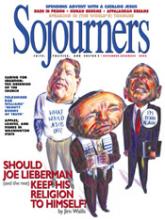Roaming the High Sierra of California more than 20 years ago, my friends and I thought there were few people quite like us. We were wilderness guides and radical ecological Christians (or so we thought). "Minimum impact" was our motto. We aimed to "live lightly on the land" and John Muir, rather than the apostle Paul, was the writer of our sacred texts.
Conjuring up images of well-fed churchgoers with a Bible in one hand and a chain saw in the other, mainstream evangelical Christianity, from which we all came, was no friend to the wilderness we cared about passionately. Sadly, I read Lynn White Jr.'s now famous 1967 article in Science magazine ("The Historical Roots of Our Ecological Crisis") accusing Christianity of promoting a theology of domination over nature, thus contributing to ecological crises, and I agreed. "Yup, that's my people."
Yet something happened on the way to ecological apocalypse. Although the church does not have a strong history of either environmental theology or practice, current theological and environmental statements and church leadership look nothing like the landscape I viewed as a young wilderness guide a mere 20 years ago. Even theologically conservative churches now promote environmental theologies and programs.
In part this change is an inevitable response to what Brazilian liberation theologian Leonardo Boff calls the "cry of the earth, cry of the poor." Human problems and crises can not be separated from environmental destruction. Throughout the Third World, hundreds of thousands die due to polluted water, contaminated land, polluted air, deforestation, and poor sanitation facilities. Increasingly, battles among groups of peoples and nations will be due to environmental scarcity, as burgeoning populations seek fuel, food, water, and land. Precious resources will have been destroyed or damaged as we log, mine, kill, dump toxins, and otherwise trash our own home.
Read the Full Article

